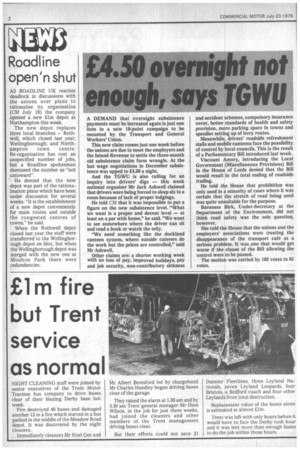A DEMAND that overnight subsistence payments must be increased again
Page 4

If you've noticed an error in this article please click here to report it so we can fix it.
is just one item in a new 10-point campaign to be mounted by the Transport and General Workers' Union.
This new claim comes just one week before the unions are due to meet the employers and the Inland Revenue to settle the three-month old subsistence claim form wrangle. At the last wage negotiations in December subsistence was upped to £4.50 a night.
And the TGWU is also calling for an inquiry into drivers' digs — this week national organiser Mr Jack Ashwell claimed that drivers were being forced to sleep six to a room because of lack of proper lodgings.
He told CM that it was impossible to put a figure on the new subsistence level. "What we want is a proper and decent level — at least on a par with home," he said. "We want to see somewhere where the driver can sit and read a book or watch the telly.
"We need something like the dockland canteen system, where outside caterers do the work but the prices are controlled," said Mr Ashwell.
Other claims are: a shorter working week with no loss of pay, improved holidays, pay and job security, non-contributory sickness and accident schemes, compulsory insurance cover, better standards of health and safety provision, more parking space in towns and speedier setting up of lorry routes.
Meanwhile, drivers' roadside refreshment stalls and mobile canteens face the possibility of control by local councils. This is the result of a Parliamentary Bill introduced last week.
Viscount Amory, introducing the Local Government (Miscellaneous Provisions) Bill in the House of Lords denied that the Bill would result in the total ending of roadside trading.
He told the House that prohibition was only used in a minority of cases where it was certain that the stretch of road being used was quite unsuitable for the purpose.
Baroness Birk, Under-Secretary at the Department of the Environment, did not think road safety was the sole question, however.
She told the House that the unions and the employers' associations were treating the disappearance of the transport café as a serious problem. It was ,one that would get worse if the clause of the Bill allowing the control were to be passed.
The motion was carried by 103 votes to Si votes.
















































































































